Family Immigration Attorney
Home » Family Immigration Attorney
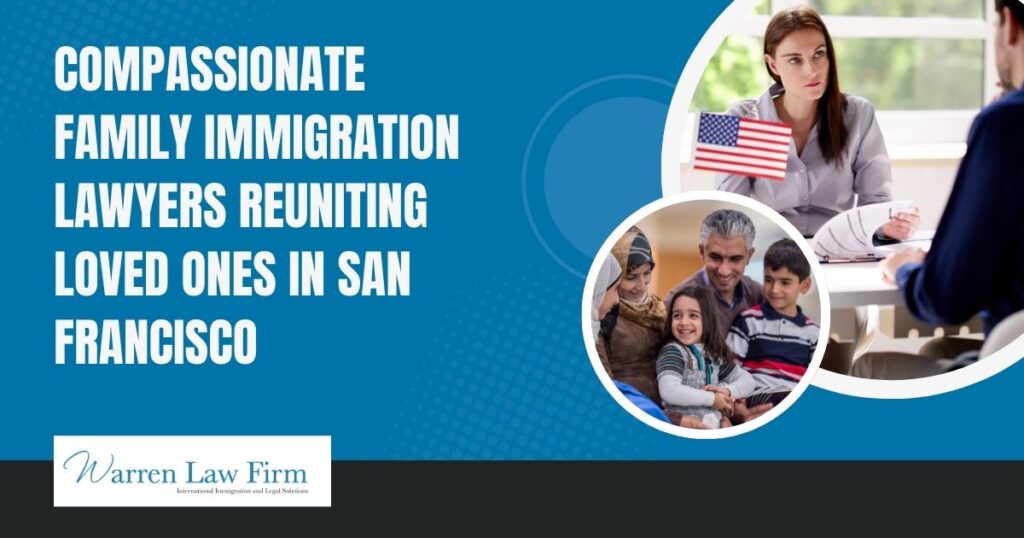
Our Family Immigration Attorney Services
For over twenty years, Warren Law Firm has successfully helped people around the world live legally and happily in the United States.
Helping families stay together with the guidance of our experienced family immigration attorney.
We can help you obtain the right visa for your needs and circumstances.
Table of Contents
Request A Consultation
Meet The Attorney
Angela D. Warren
With more than 20 years of immigration and business immigration experience, Angela Warren has helped hundreds of individuals, families and businesses.
Get The Immigration Help You Deserve
Bringing Families Together: Working With a Family Immigration Attorney
U.S. immigration law can be overwhelming, especially when it comes to reuniting family members. At Warren Law Firm, we assist clients with a wide range of family immigration needs, including marriage visas, fiancé visas, and family-based green card applications.
Our experienced team works closely with you to understand your unique situation and ensure that your application is handled with the utmost care and attention to detail.
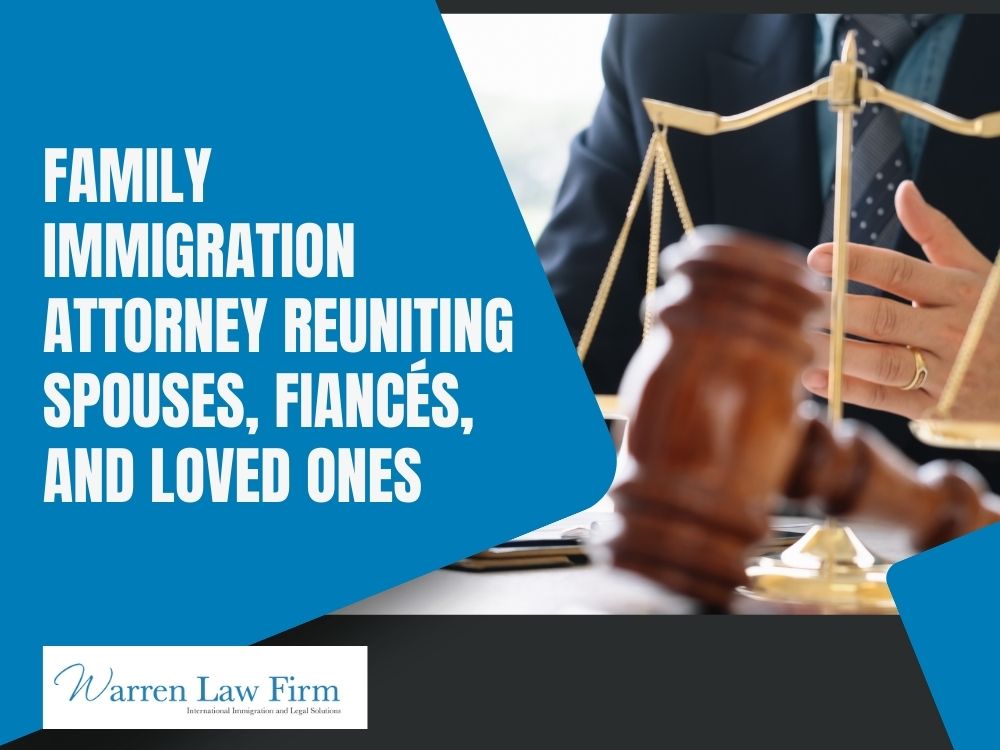
Why Hiring a Family Immigration Attorney Early Matters
Hiring a family immigration attorney early in the process can make a big difference in your case. An experienced lawyer helps you understand eligibility, gather the right documents, and avoid errors that could delay or harm your application. Early legal guidance also gives you time to prepare for additional evidence requests, interview questions, or any issues that could complicate your case.
This approach not only makes the visa process smoother but also improves your chances of approval. At Warren Law Firm, we take the time to thoroughly assess your case and guide you at every step.
Family, Fiancé, and Spouse Visas With Help From a Family Immigration Attorney
Each of these family visas has its requirements, depending on your circumstances. Generally, individuals seeking these visas must have a U.S. citizen or lawful permanent resident sponsor them. The sponsor must also prove that they can financially support the person coming to the U.S. and meet other criteria.
Whether you need a family immigration attorney to help bring your relatives to the U.S. or a marriage visa lawyer to guide you through spousal sponsorship, our experienced immigration attorneys can guide you through the process of obtaining the right visa for your needs and help you face any challenges that may arise.
Hiring a Marriage Visa Lawyer: What Couples Need to Know
When it comes to hiring a marriage visa lawyer, one of the most critical steps is finding an attorney with extensive experience in family and marriage-based immigration cases. A knowledgeable lawyer will help ensure that all required forms are complete, supporting documents gathered, and deadlines met. They can also provide valuable insights into overcoming potential obstacles, such as requests for additional evidence or concerns about the validity of your marriage.
By working with a skilled attorney, couples can reduce the stress of the immigration process and feel confident that their case is being handled with care and professionalism.
How a Marriage Visa Lawyer Strengthens Your Case
A marriage visa lawyer does more than file forms—they help couples demonstrate the authenticity of their relationship and prepare strong applications. With stricter scrutiny of spousal visas, having a knowledgeable attorney can reduce delays and the risk of denial.
Warren Law Firm carefully reviews timelines, joint records, communications, and other evidence to present a compelling case. We also help clients prepare for interviews, answering key questions USCIS officers often ask. Whether your spouse is in the U.S. or abroad, we tailor our strategies to build a credible, strong application.
Get The Immigration Help You Deserve
Types of Family Visas
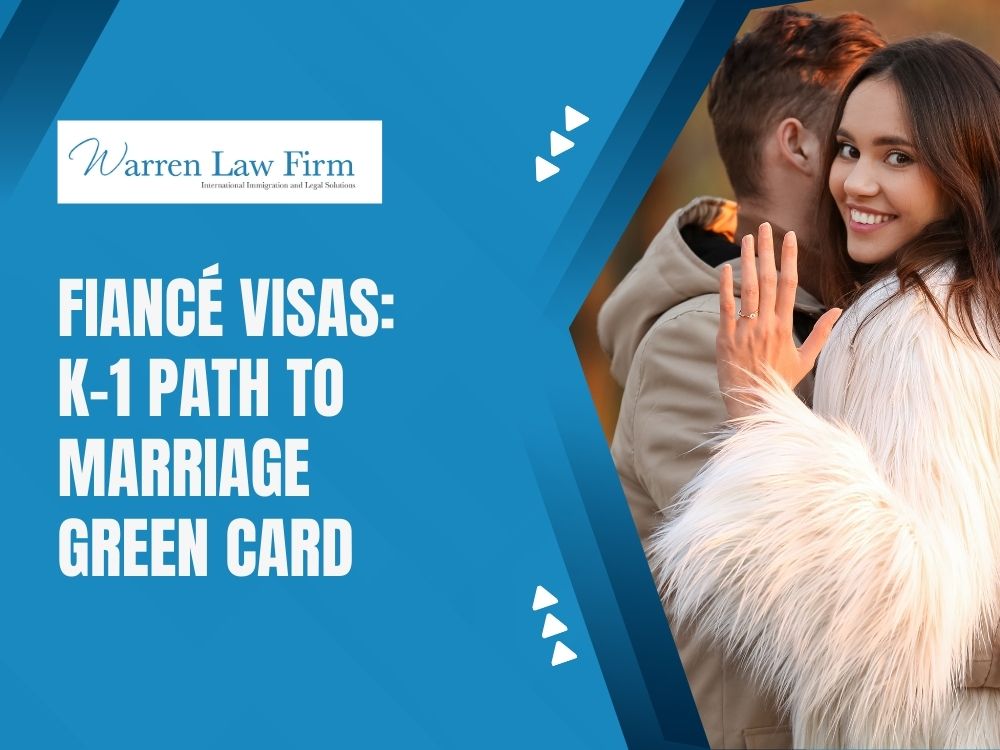
Fiancé Visas
If you are engaged to be married to a U.S. citizen, you may be eligible for a K-1 fiancé visa. After you enter the United States on this visa, you must marry your sponsor within 90 days. After you marry, you can then apply for a green card to become a lawful permanent resident. Our attorneys can help you with each step of this process.
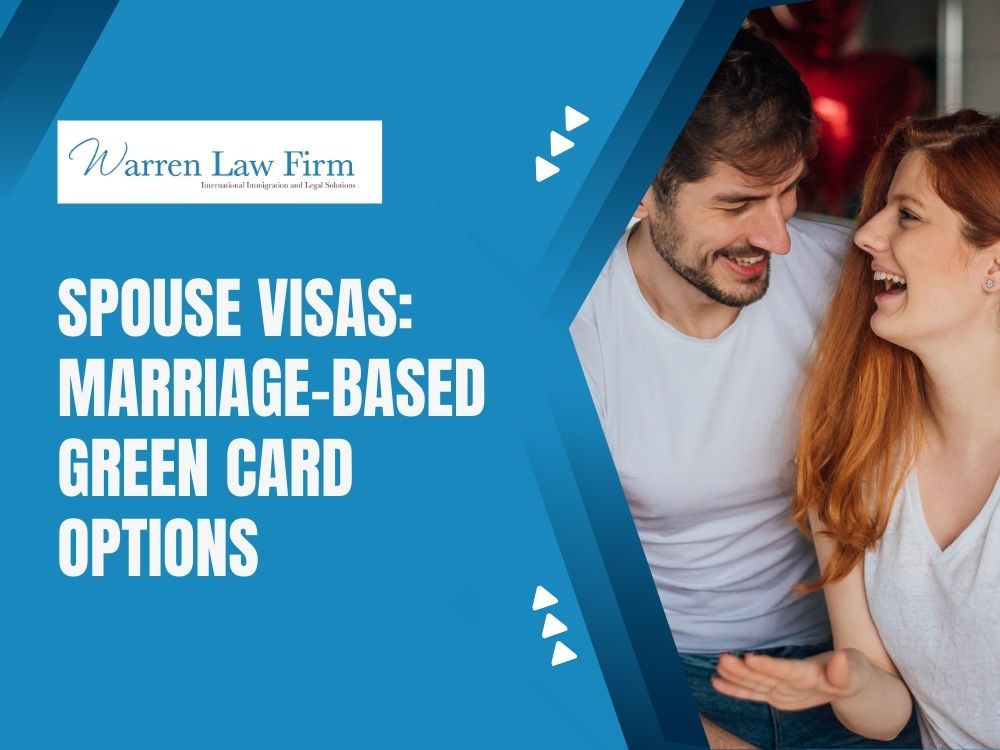
Spouse Visas
If you are already married to a U.S. citizen, you may be eligible for a spouse visa. There are two types of spouse visas: a CR1 visa is for individuals who have been married for less than two years, while an IR1 visa is for individuals who have been married for more than two years. If you are married to a lawful permanent resident, you will get a family preference visa.
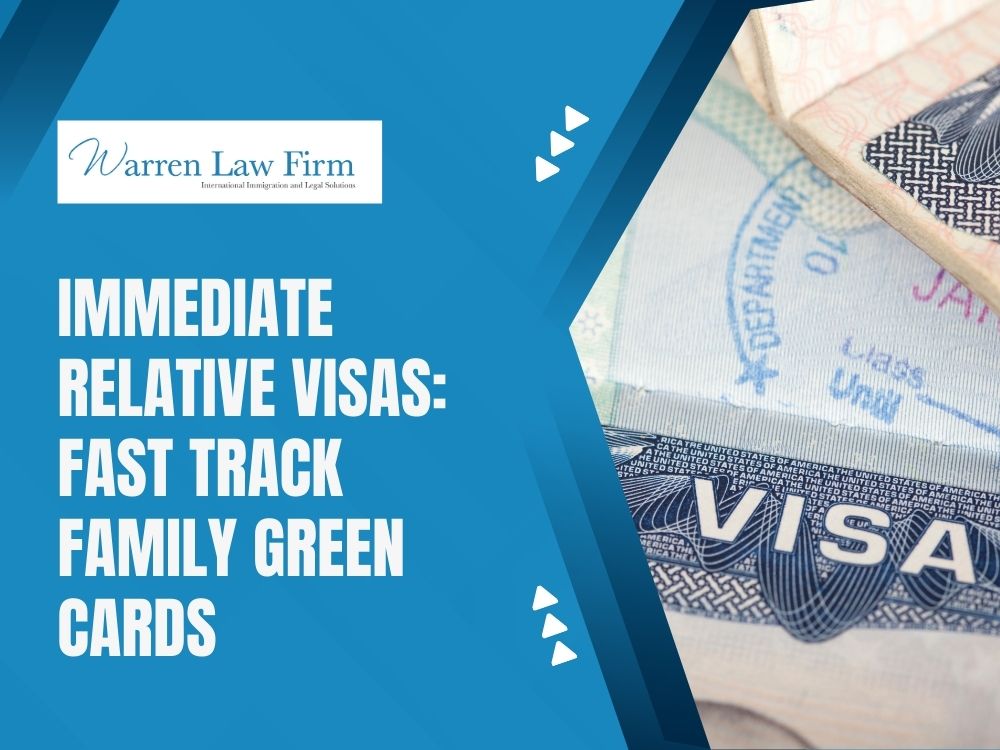
Immediate Relative Visas
An immediate relative visa has no annual limits and allows you to apply for a green card as soon as you enter the United States. You may be eligible for an immediate relative visa if you are the spouse of a U.S. citizen, the child of a U.S. citizen (under 21 years old and unmarried), or the parent of a U.S. citizen (if the citizen is 21 years or older).
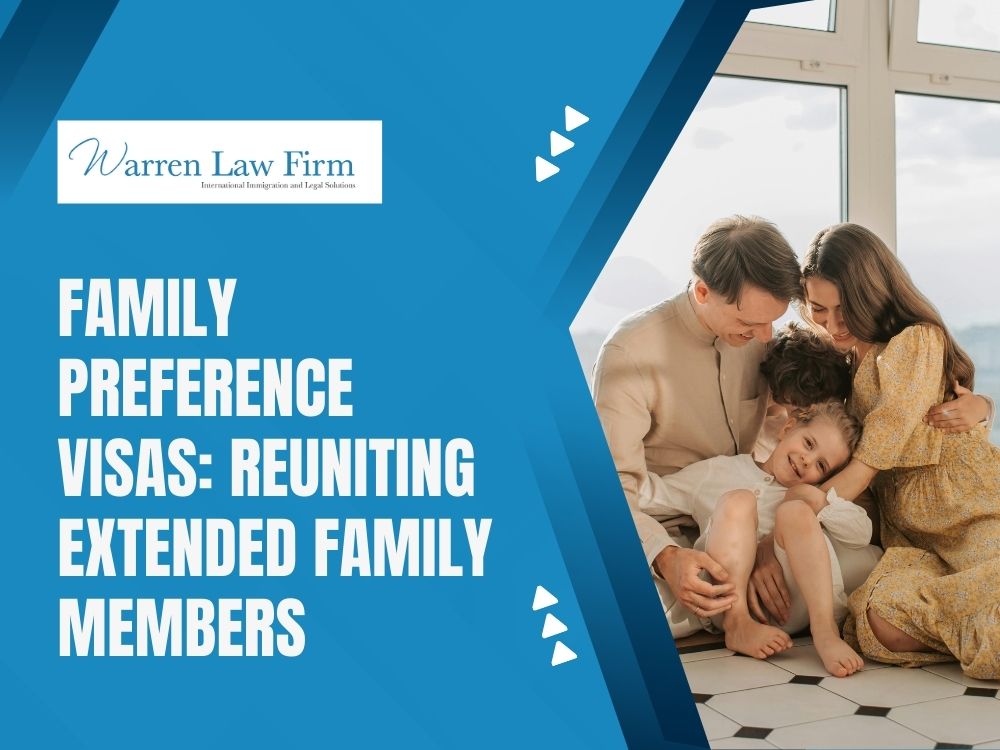
Family Preference Visas
Family preference visas are subject to annual limits and have longer wait times before you can apply for a green card. You may be eligible for a preference visa if you are the spouse of a lawful permanent resident, the child of a lawful permanent resident, the unmarried child of a U.S. citizen (21 years or older), the married child of a U.S. citizen, the sibling of a U.S. citizen (21 years or older) or the parent of a U.S. citizen (if the citizen is over the age of 21).
Get The Immigration Help You Deserve

Family Immigration Attorney FAQs
Navigating the complexities of family immigration law can be challenging, which is why we’ve compiled a list of Frequently Asked Questions (FAQs) to help demystify the process. We encourage our clients to explore this resource as a starting point for their immigration inquiries. For more detailed and personalized assistance, our dedicated family immigration attorneys are always available for consultations.
How Can I Avoid Delays in my Family Immigration Case?
Family immigration cases can often face delays due to various factors, such as incomplete documentation, insufficient evidence of the qualifying relationship, or backlogs in processing times at immigration offices.
To avoid these setbacks, it is crucial to ensure that all forms and supporting materials are accurately completed and submitted. Additionally, responding promptly to any requests for additional evidence from immigration authorities can help keep the process on track.
Staying informed about current processing times and changes in immigration policies is equally important, as these factors can also impact case timelines. Working with an experienced family immigration attorney can make a significant difference in addressing potential delays and ensuring a smoother progression of your case.
Why choose Warren Law Firm for Family Immigration?
At Warren Law Firm, we understand that the immigration process can be overwhelming and stressful for individuals and their families. That’s why we’re committed to providing personalized and compassionate legal assistance every step of the way. Our team of experienced family immigration attorneys has a deep understanding of U.S. immigration law and a proven track record of success in helping clients achieve their immigration goals. Warren Law Firm is here to support you with expert guidance and representation.
What are the Financial Requirements for Family Immigration?
The U.S. government requires sponsors to demonstrate their capability to financially support their family members, ensuring that immigrants will not become public charges. It involves submitting an Affidavit of Support, a legally binding document in which the sponsor pledges to provide financial support to the immigrant.
The minimum income requirement generally equates to 125% of the federal poverty level, but this can vary depending on the sponsor’s household size, location, and specific circumstances.
How long does the Process for a Family-Based visa usually take?
The processing time for family-based visas can vary significantly depending on the type of visa, the applicant’s country of origin, and the current processing times of U.S. Citizenship and Immigration Services (USCIS) and the Department of State. Immediate relative visas tend to process faster than family preference visas due to the cap on the latter.
Can I work in the United States while waiting for my Family-Based Green Card?
If you are already in the United States and awaiting the adjustment of your immigration status, you may be eligible to apply for a work permit (Employment Authorization Document or EAD). It will allow you to work legally in the U.S. while processing your green card application.
Can I sponsor more than one Family Member at a Time?
Yes, you can sponsor more than one eligible family member, but you must file separate visa petitions for each individual and ensure you meet the financial requirements for each.
What if my Family Member’s Visa Application is denied?
A visa denial can occur for several reasons, including failure to prove financial stability or ineligibility based on the immigration law. You can address the issues that led to the denial and reapply; in some cases, you may appeal the decision. It’s advisable to consult with an immigration attorney to explore the best course of action.
How does the priority date affect my Family-Based Immigration Application?
The priority date on your Form I-130 approval notice determines your place in line for a visa. Since the number of visas available each year for family preference categories is limited, those with earlier priority dates are considered first as visas become available.
How to write an Immigration Letter for a Family Member?
When writing an immigration letter for a family member, it’s essential to include key details that establish your relationship and support the purpose of their application. Begin by addressing the letter to the appropriate immigration authority. Clearly identify yourself, including your full name, contact information, immigration status in the U.S., and your relationship to the family member.
Next, explain the purpose of the letter. For example, if your family member is applying for a visa, green card, or adjustment of status, specify how their presence in the U.S. would benefit your family and the community. Provide personal anecdotes or examples that demonstrate their character, contributions, and responsibility. Supporting details about their employment, education, or community involvement can further strengthen the letter.
Conclude by expressing your willingness to provide additional information or documentation if needed. Maintain a professional and empathetic tone throughout, ensuring the content is honest and concise. An immigration attorney can review your letter to ensure it aligns with legal and procedural requirements.
Can a non-Family Member sponsor an Immigrant?
Yes, a non-family member can sponsor an immigrant in specific situations, though it is less common. For instance, an employer can sponsor a foreign worker through employment-based visas, such as the H-1B or an employer-sponsored green card.
However, most individual sponsorships are limited to specific familial relationships. If you’re unsure about your eligibility to sponsor someone, consulting with an immigration attorney can provide clarity and guidance based on your unique circumstances.
Let Us Help You
At Warren Law Firm, we understand the importance of family and the desire to be together. Our team of experienced immigration attorneys is dedicated to helping families navigate the complex U.S. immigration system and obtain the necessary visas for their loved ones. Contact us today to schedule a consultation and learn how we can help you with your family-based immigration needs.
